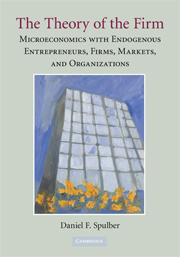 The Theory of the Firm
The Theory of the Firm Book contents
- Frontmatter
- Contents
- Preface and Acknowledgments
- Introduction
- PART I THE THEORY OF THE FIRM
- PART II THE ENTREPRENEUR IN EQUILIBRIUM
- PART III HUMAN CAPITAL, FINANCIAL CAPITAL, AND THE ORGANIZATION OF THE FIRM
- PART IV INTERMEDIATION BY THE FIRM
- 8 The Firm as Intermediary in the Pure-Exchange Economy
- 9 The Firm versus Free Riding
- PART V MARKET MAKING BY THE FIRM
- 12 Conclusion
- References
- Author Index
- Subject Index
8 - The Firm as Intermediary in the Pure-Exchange Economy
Published online by Cambridge University Press: 05 June 2012
- Frontmatter
- Contents
- Preface and Acknowledgments
- Introduction
- PART I THE THEORY OF THE FIRM
- PART II THE ENTREPRENEUR IN EQUILIBRIUM
- PART III HUMAN CAPITAL, FINANCIAL CAPITAL, AND THE ORGANIZATION OF THE FIRM
- PART IV INTERMEDIATION BY THE FIRM
- 8 The Firm as Intermediary in the Pure-Exchange Economy
- 9 The Firm versus Free Riding
- PART V MARKET MAKING BY THE FIRM
- 12 Conclusion
- References
- Author Index
- Subject Index
Summary
Achieving transaction benefits requires incurring transaction costs. Transaction costs arise in decentralized exchange because consumers must incur costs to gather information, find each other, negotiate the terms of trade, and carry out the trade. Transaction costs also arise when firms centralize exchange because establishing and operating markets requires costly communication and information processing. Firms are needed in the pure-exchange economy because they can improve the efficiency of transactions. The purpose of this chapter is to show how firms contribute to the efficiency of the pure-exchange economy.
A fundamental impediment to trade in the pure-exchange economy is the absence of a double coincidence of wants. A consumer wishing to trade wheat for cloth must find another party willing to trade cloth for wheat. There may simply not be another consumer with the right preferences or endowments to be a trading partner. Even if such a consumer exists, consumers cannot obtain gains from trade unless they can meet at a convenient time. Potential trading partners may be separated by distance when travel and transportation are costly. Finally, preferences and endowments can be affected by random shocks so that consumers can only find trading partners in some states of the world. Consumers fail to capture gains from trade due to problems in finding the right trading partner. These lost gains from trade are implicit transaction costs.
- Type
- Chapter
- Information
- The Theory of the FirmMicroeconomics with Endogenous Entrepreneurs, Firms, Markets, and Organizations, pp. 295 - 328Publisher: Cambridge University PressPrint publication year: 2009


